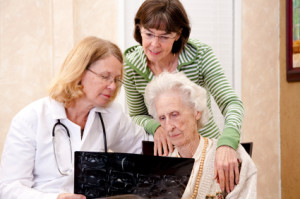I was the caregiver for a number of family members for many, many years. Sometimes I could manage just fine. But at other times I felt overwhelmed and unappreciated. Even when I knew what to do, I was still exhausted and worried all the time. All I wanted to do was to crawl into bed and just sleep. Even though I wanted to take care of the seniors in my life, sometimes it all became too much. I admire professionals who take care of those who are disabled, sick or dying every day. But I also know it comes at a cost to the person doing the caregiving. So, let’s talk about the signs of caregiver stress and then discuss ways you can ask for help. (Help is out there, even if it doesn’t come from your family.)
Are You in Caregiver Burnout?
Here are just some of the signs of caregiver stress and burnout: feeling physically exhausted, emotionally overwhelmed, anxious, hopeless, angry, depressed, isolated, mentally drained, lonely and frustrated. You may be too tired to make the effort to do the things you used to do for yourself or your loved one. You might be getting ill yourself. You may feel as though nobody is listening to your concerns. You may want to lash out at your co-workers or your friends and family.
Why Do Caregivers Burn Out?
•Caregivers may not be able to sleep because their loved ones are up all night.
•Caregivers may not have the necessary training to offer the care that is needed.
•Caregivers may be physically doing more than they can.
•Caregivers may have to quit their jobs to stay home with their loved ones.
•Caregivers may go bankrupt because of increasing expenses.
•Caregivers may feel guilty if they take time out for themselves.
•Caregivers may feel that they should be strong and not need any help.
•And caregivers usually don’t ask for help.
Unfortunately, by the time you need extra help, you may be too tired, emotionally fatigued or depressed to ask for it. You have to get a support team in place when you begin caregiving so that you don’t get to your breaking point. Start planning ahead of time, before you need the help.
Getting the Help You Need
The first person to ask is the patient’s primary doctor. The doctor won’t be able to send in someone to take over for you, but he or she may be able to order a visiting nurse, medical equipment or to help you find a person to help. You can also hire a geriatric care manager or a patient advocate—people who can help design and put into place a plan to get you the help you need. This is especially helpful if you live a significant distance away from your loved one. Another person you can turn to is your local hospital’s social worker, who already knows the resources available in your town and can give you a list of people you could call. Organizations such as the Area Agency on Aging, Meals on Wheels, Dial-a-Ride, religious organizations and your local senior center can help and are usually free. Illness- or condition-specific organizations or groups such as the Well Spouse Association can provide support and information.
Another great option to consider is an adult day care facility. Once your loved one gets used to the new place, she will enjoy getting out and interacting with others and you will enjoy the break. (And your loved one might enjoy a break from you too.) There may also be night care available in your community so you can get a good night’s sleep. You may also want to look into online support groups, local support groups, and individual and group therapy options. There are also support groups available for your loved one. You don’t have to be the only person giving your loved one comfort and support.
Speak Up and Speak Out to Get the Help You Need
You don’t have to feel alone or be alone with the stressors you are facing. But people won’t know you need help unless you tell them. Speak up and speak out to get what you and your loved one needs. And don’t forget to give yourself credit for all that you are already doing. You don’t have to be a superhero—you already are an everyday hero.
This is an edited excerpt from “The Caregiver’s Path to Compassionate Decision Making – Making Choices for Those Who Can’t,” pp. 107-110, by Viki Kind, MA, (2010, Greenleaf Book Group).
About the Author:
Viki Kind, MA is a clinical bioethicist, medical educator and hospice volunteer. She has lectured across the United States teaching healthcare professionals to have integrity, compassion and to improve end-of-life care through better communication. Patients, families and healthcare professionals rely on Viki’s practical approach to dealing with challenging healthcare dilemmas. She has also been a caregiver for many years for four members of her family in the Los Angeles area. Visit her Website at www.thecaregiverspath.com, and her blog at www.Kindethics.com.
The Caregiver’s Path is available at The Savvy Gal store, www.amazon.com, www.barnesandnoble.com, www.borders.com, and www.thecaregiverspath.com

